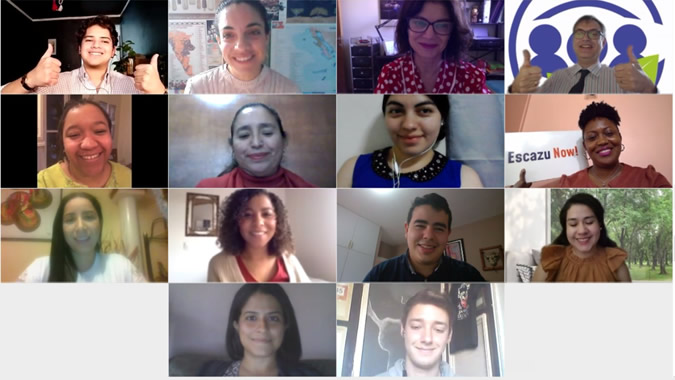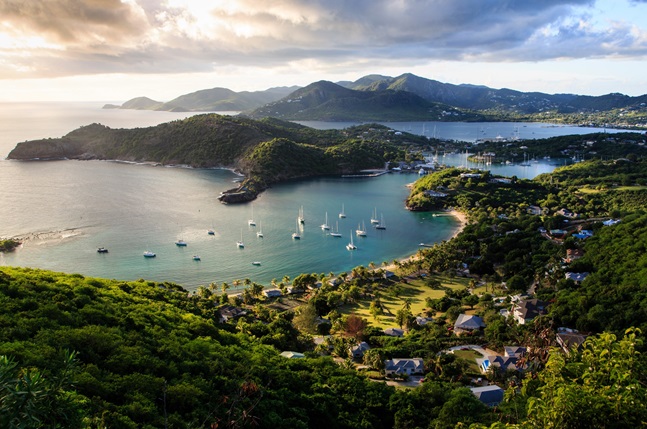Young People from Latin America and the Caribbean Reaffirm their Commitment to Environmental Protection and the Escazú Agreement
Topic(s)
At a virtual side event prior to the second meeting of the signatory countries to the Agreement, young people debated about how to support the ratification and implementation of the region’s first environmental treaty.

Youth from more than 19 Latin American and Caribbean countries met this Tuesday, December 8 at a virtual gathering to reaffirm their commitment to environmental protection and the Regional Agreement on Access to Information, Public Participation and Justice in Environmental Matters in Latin America and the Caribbean (Escazú Agreement), in the run-up to the Second Meeting of the Signatory Countries to the region’s first environmental treaty, which will be held on December 9-10.
The event entitled “Youth for Escazú” was organized jointly by the Economic Commission for Latin America and the Caribbean (ECLAC) and the United Nations Children’s Fund (UNICEF), with the support of numerous civil society organizations.
It was inaugurated by Carlos de Miguel, Chief of the Policies for Sustainable Development Unit of ECLAC’s Sustainable Development and Human Settlements Division, on behalf of the Secretariat of the Escazú Agreement; Hanoch Barlevi, from UNICEF’s Regional Office for Latin America and the Caribbean; Karetta Crooks, Representative of the Public for Escazú; and Kyara Cascante, a Youth Champion of Escazú.
In his welcome remarks, Carlos de Miguel recalled that the Escazú Agreement process is an open, transparent and participatory one in which the public – meaning all Latin American and Caribbean people – can participate. “I want to specially thank the young people, girls and boys of the region, since they have become the champions of Escazú and are leading the national and regional processes to advance not only on the agreement’s ratification but also its implementation,” he stated.
He added that the Escazú Agreement is a call to do things differently. “It is a call to change production and consumption patterns on the basis of respect for human rights and the environment. As the United Nations Secretary-General (António Guterres) said just days ago, we must make peace with the planet Earth. This is a very strong call because an imminent crisis can be seen in our society, precisely because we are not doing things right. And, in contrast to the general state of affairs, in the world of young people, environmental protection has been a rallying cry for quite some time,” De Miguel indicated.
Meanwhile, Hanoch Barlevi from UNICEF warned that today’s youth will suffer the consequences of environmental harm the most in the future, and they will be the first generation to have been born and raised in a more dangerous and more uncertain world as a result of climate change and environmental degradation.
“All of you have assumed a role as agents of change, fighting to defend the environment, demanding changes and taking action. You are committed to the environmental climate agenda. To ensure resilience, we will have to ensure the participation of children, adolescents and young people,” Barlevi sustained.
In her remarks, Karetta Crooks explained that despite all the injustices on the rise in our world, and now exacerbated by the COVID-19 pandemic, it is encouraging to see how young people from Latin America and the Caribbean have raised their voice in defense of the environment and to achieve the Escazú Agreement’s effective implementation.
“In collaboration with the Access Initiative and other institutions, across Latin America and the Caribbean we have announced (in March 2020) five youth champions of Escazú in Argentina, Chile, Colombia, Costa Rica and Saint Vincent and the Grenadines. This was a critical agreement for recognizing environmental rights in the region. The pandemic forced changes in their plans this year and, despite not being able to meet in person, they have carried out several virtual gatherings to show young people the possibility of advocating for such a noble cause in these difficult times,” the representative of the public emphasized.
In a similar vein, Kyara Cascante, the Youth Champion of Escazú from Costa Rica, thanked all the young people who have furthered the Escazú Agreement in their respective communities, with a positive attitude of wanting and being able to make change and for that change to be significant.
“Each of us, regardless of where we are or what we have, can do something. This is key for being able to influence others and spark change. We as Champions (of Escazú) try to take this inspirational message to other youth populations in order to keep working and advancing on the implementation of this Agreement,” she said.
During the event, presentations were also made on the package of tools available to young climate activists in Latin America and the Caribbean and the Course on SDG 16 and the Escazú Agreement, which is centered on the targets and indicators linked to access rights (access to information, public participation and justice), along with the protection of environmental defenders – both of which are essential elements for environmental conservation and for decision-making in environmental matters.
Type
Country(ies)
- Latin America and the Caribbean
Contact
Public Information Unit
- prensa@cepal.org
- (56 2) 2210 2040
